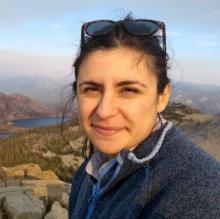Julia Goldman-Hasbun
Why did you decide to pursue a graduate degree?
I've always loved the research process, although it took me a while to discover sociology. I completed my undergrad degree in psychology here at UBC, and I remember learning in my first semester how to hand-calculate a test of significance -- it was a very exciting moment for me. During that time, I was involved in several labs and participated in MANY experiments, which exposed me to all kinds of cool things like having probes on my head, eating a small worm, running around with kids, interviewing students about mental health, and analyzing the voice-pitch of people from different political groups. After my undergrad, I knew I wanted to continue on the academic path, but I didn't know what programs to apply to, so I moved back to Montreal and worked and traveled for two years. I considered getting a PhD in psychology or doing something more practical like counselling, social work, speech-language pathology, or public health. I finally decided to get a Master of Public Health at Simon Fraser University because I figured it would open a lot of doors for me. It was a two-year degree that combined both research and practice and allowed me to explore my interests in mental health and stigma. When I realized that my more theoretical courses were what inspired and stimulated me most, I knew a PhD was the way to go. I then started my PhD in the Interdisciplinary Program at UBC (ISGP) combining policy and public health. It is a very flexible program that allowed me to take many courses from a variety of disciplines. It was awesome because at one point I was simultaneously taking a theoretical sociology course, an Indigenous education course, and a philosophy of science course. Although I still believe public health and policy are extremely important (especially right now!) something about sociology drew me in. While it can sometimes be challenging, sociology includes a huge array of perspectives and methodological approaches that I find very inspiring. Some people are hardcore positivists, while others are postmodernists, some do qualitative work, while others do quantitative. Some people do complex mathematical modelling stuff using big data, while others live in cults to do ethnographic work. I honestly feel like sociology is the coolest discipline -- the opportunities are endless, both intellectually and for fostering social change!
Why did you decide to study at UBC?
My journey at UBC started back in 2011 when I started my undergrad. It's silly to me now, but growing up in downtown Montreal gave me the vision of Vancouver as some kind of utopia or oasis. Back then, I imagined going hiking every weekend, running by the beach every day, surrounded by beautiful animals and plants, with environmentally friendly policies, and super friendly people. Of course, Vancouver is a city like any other; while it's been a great place to study and many of those things have been true, it's by no means perfect. I guess I must have missed Vancouver when I moved back to Montreal, though, because I came back and I still haven't left!
What is it specifically, that your program offers, that attracted you?
As I mentioned, I started in the ISGP program, which was great in its flexibility, but I felt a bit lost. When I took a course in the sociology department, I started longing to be part of their tight-knit cohort. I was also attracted to the awesome faculty in the department, the regular research and professional development seminars, as well as the rigorous training in both theory and methods.
What was the best surprise about UBC or life in Vancouver?
This sounds small, but one of the best surprises about UBC for me has been how supportive and kind many of the staff have been. The advisors and admin team in the department are always so responsive and seem to really care about the well-being and success of the students. Grad school can be really overwhelming, so to have people in the department (other than your direct supervisors) who are there to support you really makes a difference.
What aspects of your life or career before now have best prepared you for your UBC graduate program?
Sometimes I beat myself up for having deliberated so much about what research direction to go in and taking two years off school. But I think that time allowed me to grow a lot. Undergrad was a stressful time for me, and I didn't really have the opportunity to explore my own interests or develop good working and lifestyle habits until I was out of school. I also feel extremely privileged that I was able to take several months to travel around Southeast Asia and Europe, which exposed me to different customs and social structures that inform my perspective on sociology and on life in general.
What advice do you have for new graduate students?
Don't be afraid to change your mind. I've changed my mind so many times -- programs, disciplines, research areas -- and I couldn't be happier about where I ended up. The work is so much easier when your heart is in it, and many of the skills gained doing other things can be transferable. Time is only lost if you’re miserable!
